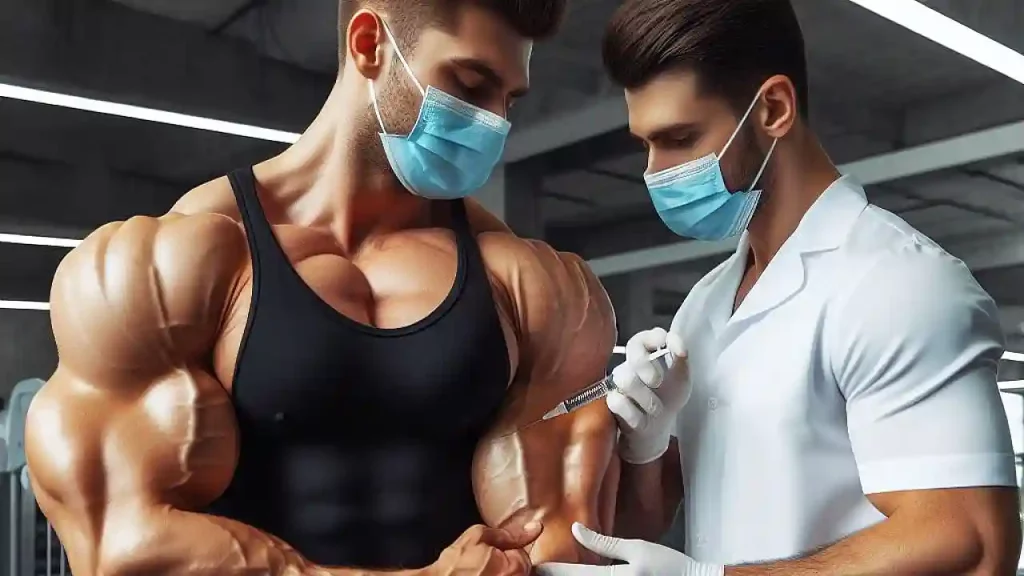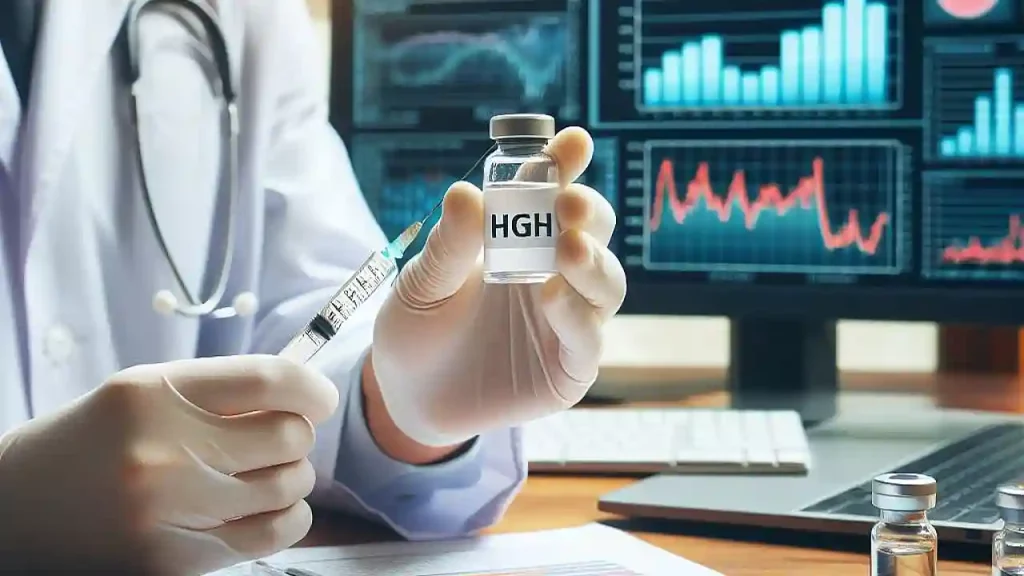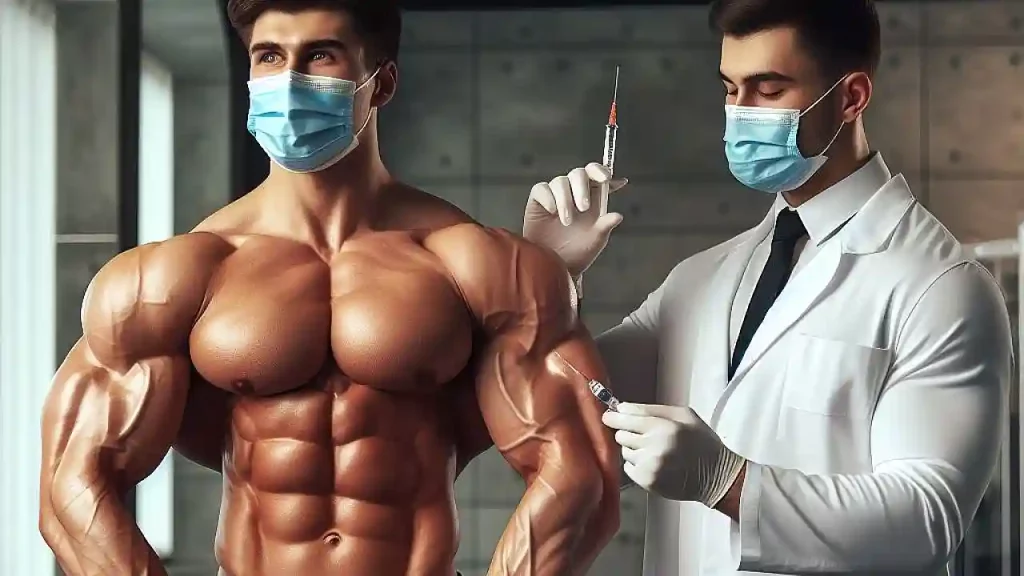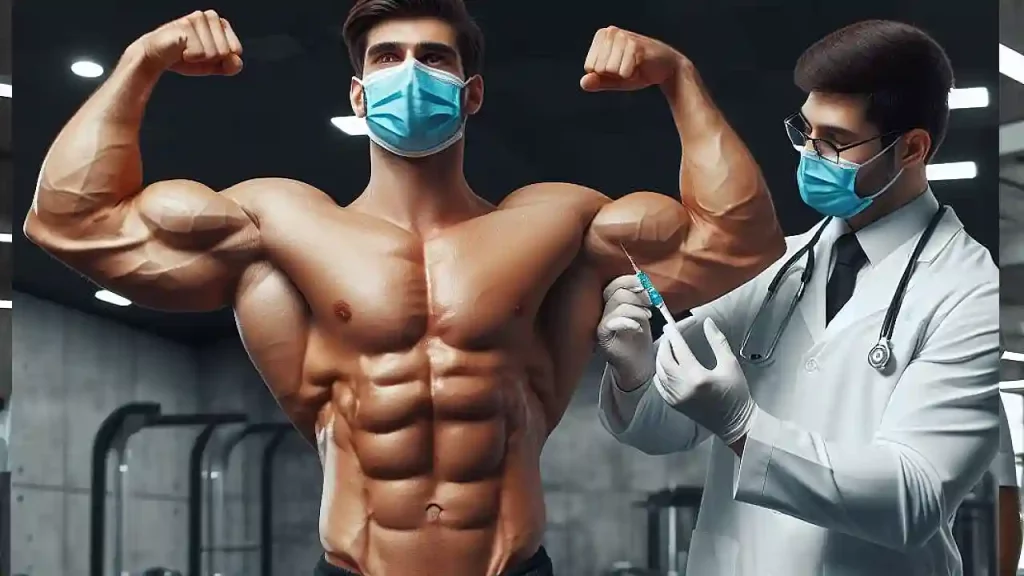hgh boost testosterone
Human Growth Hormone (HGH) and testosterone are pivotal players in the intricate symphony of hormones that regulate our bodies. Each with its unique set of functions, HGH is primarily responsible for growth and cell regeneration, while testosterone, often associated with masculinity, plays a crucial role in muscle development, bone density, and libido.

1. HGH: The Architect of Growth
Human Growth Hormone, as the name implies, is instrumental in the growth processes that occur during childhood and adolescence. Produced by the pituitary gland, HGH stimulates growth, cellular repair, and regeneration. It plays a central role in maintaining healthy tissues, organs, and bones.
1.1 Testosterone: The Essence of Masculinity
Testosterone, on the other hand, is a key hormone for both men and women, though it is found in higher concentrations in males. Produced in the testes in men and ovaries in women, testosterone contributes to the development of male reproductive tissues and is crucial for the maintenance of muscle mass, bone density, and overall vitality.
Common Interest in Hormonal Enhancement
The interest in hormonal enhancement has surged in recent years, fueled by a desire to optimize health, fitness, and even slow down the aging process. People are exploring various avenues to boost these hormones, seeking potential benefits ranging from increased energy and muscle mass to improved overall well-being.
Understanding the intricate relationship between HGH and testosterone is at the forefront of this exploration. As we delve deeper into the realms of hormonal balance, it’s essential to separate fact from fiction and discern the potential advantages and risks associated with any endeavors to enhance these crucial hormones. In the following sections, we will dissect the mechanisms, controversies, and implications of whether HGH truly boosts testosterone levels.
2. Understanding HGH and Testosterone
2.1 Definition and Role of HGH
Human Growth Hormone (HGH) is a peptide hormone produced by the pituitary gland, a small gland located at the base of the brain. It serves as a potent stimulator of growth, cell reproduction, and regeneration throughout one’s life. HGH plays a pivotal role in childhood growth, influencing the height and development of bones and tissues. In adulthood, it continues to contribute to the maintenance of healthy organs, tissues, and metabolism.
2.2 Definition and Role of Testosterone
Testosterone is a sex hormone belonging to the androgen group, primarily produced in the testes in men and ovaries in women, albeit in smaller amounts. In men, it plays a crucial role in the development of male reproductive tissues, including the testes and prostate, and is responsible for the characteristic male secondary sexual characteristics such as increased muscle mass, body hair, and a deepened voice. In women, testosterone is produced in smaller amounts but is essential for maintaining bone density, muscle mass, and libido.
Significance for Growth, Development, and Overall Health
Both HGH and testosterone are indispensable for various aspects of growth, development, and overall health.
2.3 Growth and Development
HGH is a key orchestrator of growth during childhood and adolescence. It stimulates the growth of bones and cartilage, promoting height and overall physical development. In adulthood, it continues to play a crucial role in maintaining the health and integrity of various tissues and organs.
Testosterone, while commonly associated with male traits, also contributes significantly to the growth and development of both genders. It supports the development of muscle mass, bone density, and the maintenance of healthy skin.
2.4 Overall Health
The significance of HGH and testosterone extends beyond mere physical appearance. These hormones influence metabolic processes, immune function, and overall vitality. Adequate levels of both hormones are essential for maintaining energy levels, cognitive function, and a sense of well-being.
Understanding the intricate interplay between HGH and testosterone is essential for appreciating their collective impact on the body’s form and function. In the subsequent sections, we will explore how alterations in HGH levels may influence testosterone and the broader implications of this hormonal relationship.
3. Mechanisms of Testosterone Production
3.1 Natural Testosterone Production
Testosterone production is a finely tuned process that primarily occurs in the testes for men and the ovaries for women, with smaller amounts produced in the adrenal glands. The journey begins in the brain, where the hypothalamus releases gonadotropin-releasing hormone (GnRH). This, in turn, signals the pituitary gland to release luteinizing hormone (LH) and follicle-stimulating hormone (FSH). LH specifically stimulates the Leydig cells in the testes, prompting them to produce and release testosterone.
3.2 Factors Influencing Testosterone Synthesis
Several factors influence the synthesis of testosterone, ensuring a delicate balance within the body.
3.2.1 Age
Testosterone levels typically peak during adolescence and early adulthood. As individuals age, especially beyond 30, there is a gradual decline in testosterone production. This natural aging process can impact various aspects of health and vitality.
3.2.2 Lifestyle and Diet
Diet and lifestyle choices play a significant role in testosterone synthesis. Nutrient-rich diets, regular exercise, and adequate sleep support healthy testosterone levels. Conversely, excessive alcohol consumption, poor dietary choices, and sedentary lifestyles can contribute to imbalances.
3.2.3 Hormonal Regulation
The intricate dance of hormonal signals between the hypothalamus, pituitary gland, and the testes tightly regulates testosterone production. Disruptions in this signaling, due to conditions like hypogonadism or tumors affecting the pituitary gland, can lead to abnormalities in testosterone levels.
3.2.4 Stress and Cortisol
Chronic stress and elevated cortisol levels can negatively impact testosterone synthesis. The body’s “fight or flight” response triggered by stress diverts resources away from non-essential functions, including testosterone production.
Understanding these mechanisms provides insight into the delicate balance required for optimal testosterone production. In the following sections, we’ll explore how HGH, as another key player in the endocrine system, may influence these mechanisms and whether it has a substantial impact on testosterone levels.
4. HGH and Its Effects on Testosterone Levels
4.1 Overview of Studies or Research
Examining the existing body of research provides valuable insights into the potential connection between Human Growth Hormone (HGH) and testosterone levels.
4.1.1 Clinical Studies

Numerous clinical studies have explored the relationship between HGH and testosterone. These studies often involve diverse groups, including athletes, individuals undergoing hormone replacement therapy, and those with hormonal imbalances. Summarizing key findings from these studies will shed light on the current scientific understanding of the HGH-testosterone nexus.
4.1.2 Observational Research
Observational research, including longitudinal studies, can offer a broader perspective on the natural fluctuations in HGH and testosterone levels. This allows us to discern patterns and potential correlations that may exist under various conditions.
4.2 Possible Mechanisms of Influence
Understanding how HGH might influence testosterone production involves exploring the complex interplay between these two hormones.
4.2.1 Pituitary Stimulation
HGH, being produced by the pituitary gland, may stimulate or modulate the pituitary’s release of gonadotropins like luteinizing hormone (LH). LH, in turn, plays a pivotal role in the production of testosterone. Analyzing the literature on this potential stimulation can provide insights into the regulatory pathways.
4.2.2 Indirect Effects on Tissues
HGH’s influence on various tissues and organs may indirectly impact testosterone production. For example, if HGH promotes muscle growth, it could stimulate the release of factors that, in turn, enhance testosterone synthesis. Delving into the specifics of these indirect pathways will contribute to a nuanced understanding of the potential connections.
4.2.3 Feedback Mechanisms
Hormonal systems often involve intricate feedback loops. Investigating whether HGH has a direct or indirect feedback mechanism on the organs and glands responsible for testosterone production can uncover additional layers of complexity in this relationship.
By synthesizing the findings from studies and unraveling the potential mechanisms, we can gain a clearer understanding of whether HGH truly influences testosterone levels. The subsequent sections will delve deeper into the controversies, alternative perspectives, and practical implications of manipulating these hormones for various purposes.
Read more : DOES PINEAPPLE INCREASE TESTOSTERONE LEVELS?
5. Contrasting Opinions in the Scientific Community
5.1 Differing Views and Controversies
The landscape of scientific inquiry into the relationship between Human Growth Hormone (HGH) and testosterone is marked by a diversity of opinions and controversies.
5.1.1 Skepticism and Caution
Some researchers and medical professionals approach the HGH-testosterone connection with skepticism. They may question the methodological rigor of certain studies, the generalizability of findings, or the potential for confounding variables. Unraveling the nuances of these skeptical perspectives helps paint a comprehensive picture.
5.1.2 Enthusiastic Support
On the other end of the spectrum, there are proponents who enthusiastically support the idea of a significant link between HGH and testosterone. They may cite specific studies, anecdotal evidence, or theoretical frameworks that suggest a robust relationship. Evaluating the strength and reliability of this support is essential for a well-rounded perspective.
5.2 Conflicting Studies and Research Findings
Delving into the body of research reveals a tapestry of conflicting studies and findings regarding the HGH-testosterone relationship.
5.2.1 Inconsistent Correlations
Some studies may report positive correlations between HGH and testosterone, indicating a potential influence. Others may show no significant relationship or even suggest an inverse correlation. Analyzing the methodological variations, sample sizes, and study populations can offer insights into the reasons behind these inconsistencies.
5.2.2 Varied Populations and Interventions
Studies exploring the HGH-testosterone relationship often involve diverse populations, from athletes to individuals with growth hormone deficiencies. Additionally, interventions such as HGH supplementation or therapeutic use may yield varied results. Scrutinizing these variations helps discern the contextual factors influencing study outcomes.
5.2.3 Publication Bias and Research Gaps
The scientific community’s tendency to publish positive results over negative ones, coupled with potential research gaps, can contribute to a skewed perception of the relationship. Addressing these biases and gaps is crucial for a more nuanced understanding.
Navigating through these contrasting opinions and conflicting findings is essential for anyone seeking clarity on the HGH-testosterone relationship. The subsequent sections will explore the implications of these uncertainties and offer a balanced perspective on the potential outcomes of HGH interventions for testosterone modulation.
6. Medical Uses of HGH and Testosterone

6.1 Instances of Medical Use
Human Growth Hormone (HGH) and testosterone find legitimate medical applications, each addressing specific health concerns.
6.1.1 HGH in Medical Settings
- Growth Disorders: HGH is often prescribed for children and adolescents with growth hormone deficiencies, Turner syndrome, or chronic kidney disease.
- Muscle Wasting Conditions: Some medical conditions, such as HIV/AIDS, may lead to muscle wasting. HGH is utilized to counteract these effects.
- Adult Growth Hormone Deficiency: In adults, HGH may be prescribed to address deficiencies related to pituitary tumors, surgery, or radiation treatments.
6.1.2 Medical Use of Testosterone
- Hypogonadism: Testosterone replacement therapy (TRT) is a standard treatment for hypogonadism, a condition where the body doesn’t produce enough testosterone.
- Certain Breast Cancers: In some cases of breast cancer, testosterone-blocking medications are used to slow the growth of tumors.
6.2 Impact of Treatments on Each Other
Exploring how HGH and testosterone treatments may impact each other involves considering their separate mechanisms and potential interactions.
6.2.1 Potential Synergies
- Muscle Mass and Bone Density: Both HGH and testosterone contribute to muscle development and bone density. In certain medical scenarios, a combined approach may offer synergistic benefits.
6.2.2 Potential Contradictions
- Hormonal Balance: Altering one hormone can influence the delicate balance of the endocrine system. Excessive supplementation of either HGH or testosterone without medical necessity may lead to imbalances and adverse effects.
6.2.3 Hormonal Feedback Mechanisms
- Pituitary Feedback: HGH and testosterone interact with the pituitary gland, albeit in different ways. Understanding the potential feedback mechanisms is crucial for minimizing unintended consequences.
Impact of HGH and Testosterone Treatments on Each Other:
| Aspect | HGH Treatment | Testosterone Treatment |
| Muscle Development | Stimulates muscle growth and repair. | Enhances muscle mass and strength. |
| Bone Density | Supports bone density maintenance. | Influences bone mineralization and density. |
| Hormonal Feedback | May influence the pituitary feedback loop. | Interacts with the hypothalamus-pituitary-gonadal axis. |
| Potential Synergies | Combined benefits for muscle and bone health. | Synergistic effects on muscle mass and energy levels. |
| Potential Contradictions | Imbalances may lead to adverse effects. | Hormonal imbalances may result in negative outcomes. |
Understanding the medical applications and potential interactions of HGH and testosterone lays the groundwork for a nuanced exploration of their combined effects in the context of hormonal enhancement. Subsequent sections will delve into the considerations for those exploring these treatments for non-medical purposes.
7. Bodybuilding and Performance Enhancement
7.1 Use of HGH and Testosterone in the Fitness Community
The fitness and bodybuilding community has been drawn to the potential benefits of Human Growth Hormone (HGH) and testosterone for enhancing physical performance and aesthetics.
7.1.1 HGH in Bodybuilding
- Muscle Growth: Bodybuilders often use HGH to promote lean muscle mass development.
- Fat Loss: HGH is believed to facilitate fat metabolism, aiding in achieving a leaner physique.
- Recovery: Improved recovery times allow for more intense and frequent training sessions.
7.1.2 Testosterone in Fitness and Bodybuilding
- Muscle Building: Testosterone is a key driver of muscle protein synthesis, contributing to muscle growth.
- Strength Enhancement: Increased testosterone levels are associated with enhanced strength and power.
- Improved Recovery: Like HGH, testosterone may support quicker recovery between workouts.
7.2 Perceived Benefits and Potential Risks
While the perceived benefits of HGH and testosterone in bodybuilding are enticing, it’s crucial to consider the potential risks associated with their use.
7.2.1 Perceived Benefits
- Enhanced Muscle Growth: Users believe that HGH and testosterone can significantly amplify muscle gains.
- Improved Performance: Increased energy levels and improved recovery can lead to better workout performance.
- Aesthetics: Users often aim for a more chiseled and defined physique through hormonal manipulation.
7.2.2 Potential Risks
- Health Risks: Excessive use of HGH and testosterone can lead to adverse health effects, including cardiovascular issues and liver damage.
- Hormonal Imbalances: Unregulated use may disrupt the body’s natural hormonal balance, causing a range of side effects.
- Legal Consequences: In many regions, the non-medical use of these hormones is illegal and can result in legal consequences.
Understanding the motivations behind the use of HGH and testosterone in the fitness world is crucial for addressing the potential risks associated with these practices. Subsequent sections will explore the broader implications of such interventions, considering the ethical and legal aspects surrounding their non-medical use.
8. Potential Side Effects and Risks

8.1 Adverse Effects of HGH and Testosterone Supplementation
Before considering Human Growth Hormone (HGH) and testosterone supplementation, individuals must be aware of potential side effects and risks associated with these interventions.
8.1.1 HGH Side Effects
- Joint and Muscle Pain: Some users report pain and stiffness in joints and muscles.
- Edema (Swelling): HGH can lead to fluid retention, causing swelling in the extremities.
- Carpal Tunnel Syndrome: Increased tissue growth may compress nerves, resulting in carpal tunnel-like symptoms.
8.1.2 Testosterone Supplementation Risks
- Cardiovascular Issues: Elevated testosterone levels may contribute to cardiovascular problems, including increased risk of heart attacks.
- Hormonal Imbalances: Excessive testosterone supplementation can disrupt the natural hormonal balance, leading to mood swings and other side effects.
- Acne and Hair Loss: Androgenic effects of testosterone may cause skin issues and contribute to hair loss.
8.2 Cautionary Information for Individuals
Individuals considering HGH and testosterone supplementation should approach these interventions with caution and a thorough understanding of potential consequences.
8.2.1 Consultation with Healthcare Professionals
- Medical Guidance: Seek advice from healthcare professionals before embarking on any hormonal supplementation.
- Monitoring: Regular health check-ups and monitoring hormone levels can help identify and address potential issues early.
8.2.2 Informed Decision-Making
- Understanding Risks: Individuals should be well-informed about the potential side effects and risks associated with HGH and testosterone supplementation.
- Risk-Benefit Analysis: Weigh the perceived benefits against the potential risks and consider non-hormonal alternatives.
Legal and Ethical Considerations:
| Aspect | HGH Supplementation | Testosterone Supplementation |
| Legal Status | Restricted in many regions without prescription. | Regulated; controlled use for medical purposes. |
| Ethical Considerations | Non-medical use raises ethical questions. | Ethical considerations regarding non-medical use. |
| Long-Term Health Implications | Potential long-term risks are a concern. | Cardiovascular risks and hormonal imbalances are critical. |
Understanding the potential side effects and risks associated with HGH and testosterone supplementation is paramount for making informed decisions. The subsequent sections will delve into the legal and ethical aspects surrounding these interventions, offering a comprehensive perspective on the implications of non-medical use.
9. Legal and Ethical Aspects
9.1 Legal Considerations
The use of Human Growth Hormone (HGH) and testosterone outside of legitimate medical contexts is subject to legal regulations that vary across regions.
9.1.1 HGH Legal Status
- Prescription Requirements: In many countries, HGH is a prescription-only medication, and its use without a valid prescription is illegal.
- Regulatory Oversight: Regulatory bodies monitor and control the distribution of HGH to prevent misuse and ensure safety.
9.1.2 Testosterone Legal Status
- Controlled Substance: Testosterone is often classified as a controlled substance due to its potential for abuse.
- Prescription Necessity: Non-medical use without a prescription is illegal, with strict regulations to prevent misuse.
9.2 Ethical Considerations
Beyond legal constraints, the use of HGH and testosterone for non-medical purposes raises ethical concerns.
9.2.1 HGH Ethical Considerations
- Unapproved Use: Using HGH for non-medical reasons may be considered ethically questionable, especially when seeking enhancement rather than addressing medical conditions.
- Fairness in Competition: Athletes using HGH for performance enhancement may be perceived as gaining an unfair advantage.
9.2.2 Testosterone Ethical Considerations
- Potential for Abuse: Testosterone supplementation for non-medical purposes, particularly in sports, raises questions about fairness and integrity.
- Body Image Pressures: Ethical concerns surround the pressure to conform to certain body image standards through testosterone use.
9.3 Regulations and Guidelines in Various Regions
Regulations regarding HGH and testosterone use for non-medical purposes can vary significantly from one region to another.
9.3.1 North America
- In the United States, both HGH and testosterone are controlled substances. Their non-medical use is prohibited, and prescriptions are required.
- In Canada, similar regulations apply, with non-medical use considered illegal.
9.3.2 Europe
- Regulations vary across European countries. In some, both HGH and testosterone are strictly controlled and require prescriptions. In others, the rules may be more lenient.
9.3.3 Asia
- Regulations in Asia also differ, with some countries having strict controls on the use of these hormones outside medical contexts.
Understanding the legal and ethical dimensions of HGH and testosterone use is essential for individuals contemplating these interventions. The subsequent sections will explore the broader implications of these considerations, including the potential consequences of violating legal and ethical boundaries.
10. Summary and Balanced Perspective
10.1 Summarizing Key Points
Throughout this blog post, we’ve delved into the intricate relationship between Human Growth Hormone (HGH) and testosterone, exploring various facets:
10.1.1 Understanding Hormones
- Defined HGH and testosterone and elucidated their crucial roles in growth, development, and overall health.
10.1.2 Mechanisms of Production
- Explored the natural mechanisms behind testosterone production and the factors influencing its synthesis.
10.1.3 HGH and Testosterone Relationship
- Investigated studies suggesting a link between HGH and testosterone, exploring potential mechanisms through which HGH might influence testosterone production.
10.1.4 Contrasting Scientific Opinions
- Highlighted the diversity of views and controversies in the scientific community regarding the HGH-testosterone relationship, considering conflicting studies and research findings.
10.1.5 Medical Uses
- Explored legitimate medical uses of HGH and testosterone, considering how these treatments may impact each other.
10.1.6 Fitness and Bodybuilding Applications
- Examined the use of HGH and testosterone in the fitness and bodybuilding community, discussing perceived benefits and potential risks.
10.1.7 Potential Side Effects and Risks
- Outlined potential adverse effects associated with HGH and testosterone supplementation, offering cautionary information for individuals considering such interventions.
10.1.8 Legal and Ethical Aspects
- Addressed legal and ethical considerations surrounding the non-medical use of HGH and testosterone, discussing regulations and guidelines in various regions.
10.2 Providing a Balanced Perspective
10.2.1 Nuanced Understanding
- It is crucial to approach the relationship between HGH and testosterone with a nuanced understanding. While studies suggest a link, the intricacies of this connection and its practical implications are still under exploration.
10.2.2 Potential Benefits
- Acknowledging potential benefits of HGH and testosterone in medical contexts is important. These hormones can offer valuable interventions for conditions like growth disorders, hypogonadism, and muscle wasting.
10.2.3 Risks and Caution
- At the same time, we must be cognizant of the potential risks and exercise caution when considering non-medical use. Adverse effects, legal consequences, and ethical considerations underscore the need for informed decision-making.
10.2.4 Personalized Approach
- Recognizing that individuals may have unique health needs, a personalized approach, guided by healthcare professionals, is essential. Any decision to supplement with HGH or testosterone should be based on a thorough understanding of individual health status and goals.
In conclusion, the relationship between HGH and testosterone is a multifaceted topic that requires continual exploration. A balanced perspective involves acknowledging the potential benefits while being aware of the risks, considering the legal and ethical landscape, and making informed decisions rooted in individual health and well-being.
FAQs: Frequently Asked Questions About HGH and Testosterone
1. Can HGH increase testosterone levels?
HGH, or Human Growth Hormone, does not directly increase testosterone levels. While there might be some indirect influences on testosterone production, the relationship between HGH and testosterone is complex and not fully understood. Studies suggest potential connections, but conclusive evidence is lacking.
2. What are the benefits of HGH and testosterone supplementation?
The benefits of HGH and testosterone supplementation vary based on medical necessity and individual health conditions. In medical settings, these supplements can address growth disorders, hypogonadism, and muscle wasting. However, non-medical use for performance enhancement carries potential risks and may not guarantee the desired results.
3. Are there natural ways to boost testosterone levels?
Yes, several natural approaches can help support healthy testosterone levels. Regular exercise, a balanced diet with sufficient nutrients, proper sleep, stress management, and maintaining a healthy weight are all lifestyle factors that can positively influence testosterone production.
4. What are the potential side effects of HGH supplementation?
HGH supplementation may lead to side effects such as joint and muscle pain, edema, and carpal tunnel syndrome. It is crucial to consult with a healthcare professional before considering HGH supplementation, as excessive use can result in adverse health effects.
5. Is testosterone replacement therapy safe?
Testosterone replacement therapy (TRT) is generally safe when prescribed and monitored by healthcare professionals for individuals with clinically diagnosed low testosterone levels. However, improper use or unmonitored supplementation can lead to potential health risks, emphasizing the importance of medical supervision.
6. Can HGH and testosterone be used for anti-aging purposes?
While there is interest in using HGH and testosterone for anti-aging purposes, the scientific evidence supporting this notion is inconclusive. The risks associated with non-medical use, coupled with potential legal and ethical concerns, warrant careful consideration before pursuing these interventions solely for anti-aging purposes.
7. How do hormones like HGH and testosterone impact overall health?
Hormones like HGH and testosterone play vital roles in overall health, influencing growth, development, metabolism, immune function, and more. Maintaining a proper balance is essential for overall well-being, and disruptions in this balance can lead to various health issues.
8. What is the legal status of HGH and testosterone?
The legal status of HGH and testosterone varies globally. In many regions, these hormones are controlled substances, requiring prescriptions for medical use. Non-medical use without proper authorization is illegal and can lead to legal consequences.
9. How do HGH and testosterone affect athletic performance?
HGH and testosterone can influence athletic performance by promoting muscle growth, strength, and quicker recovery. However, their non-medical use in sports is often deemed unethical and can lead to disqualification or penalties due to potential unfair advantages.
10. Are there alternatives to HGH and testosterone supplementation for fitness and bodybuilding?
Yes, there are alternatives to HGH and testosterone supplementation for fitness and bodybuilding. Emphasizing a well-rounded approach, including a balanced diet, consistent exercise, proper rest, and potentially natural supplements, can contribute to achieving fitness goals without the potential risks associated with hormonal interventions.